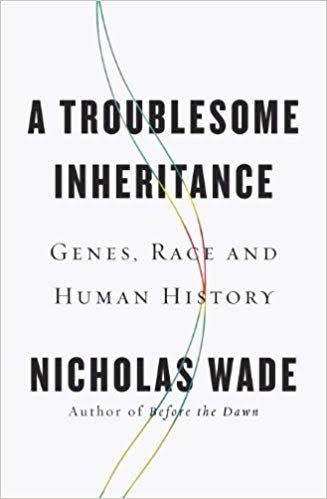"A Troublesome Inheritance" by Nicholas Wade

Above: "A Troublesome Inheritance," by Nicholas Wade. 251 pages.
This book outlines how new scientific knowledge of human genetics, post the 2003 sequencing of the human genome, comes into conflict with social science orthodoxy on race.
I completed reading this book today. The book was published in 2014 and was a New York Times Bestseller.
Conventional social science orthodoxy says that races are so close to genetically identical that racial classification has very little meaning. Furthermore, so goes the social science conventional wisdom, human evolution stopped before humans left Africa thirty thousand years ago.
This book outlines how new scientific knowledge of human genetics, post the 2003 sequencing of the human genome, comes into conflict with social science orthodoxy on race.
Wade, for twenty years a science writer for the New York Times, asserts that not only did human evolution not stop before humans migrated from Africa, but that since that migration, human evolution has been "recent, copious, and regional."
Genes under selection have varied across races. To date, studies of Caucasians, Asians and sub-Saharan Africans have found that of the hundreds of genetic regions under selection, 75% are under selection in only one race.
Science has determined that genes affect more than skin color. Brain genes, for example, are under as much evolutionary pressure as any other category of genes.
There is a growing level of scientific consensus that the so-called "warrior gene," MAO-A, encourages aggression... AND that it is found in different mutations from once race to another ie. some races may be more prone to violence than others.
Wade notes that understanding the human genome as it pertains to evolutionary traits is still in its infancy and we still know very little about the substance of racial and ethnic differences. It is inappropriate, therefore, to talk in terms of the "inferiority" or "superiority" of racial groups.
However, as the human genome is unraveled, new discoveries will inevitably made linking specific genes and specific traits by race. This will further challenge social science conventional wisdom. Wade says we should not halt the progress of scientific discovery just because of social science taboos.
After laying out the technical aspects of race and genetics, Wade sets out, in the second half of his book, to address a larger set of topics:
"The thesis presented here assumes... that there is a genetic component to human social behavior; that this component, so critical to human survival, is subject to evolutionary change and has indeed evolved over time; that the evolution in social behavior has necessarily proceeded independently in the five major races and others; and that slight evolutionary differences in social behavior underlie the differences in social institutions prevalent in major human populations."
One selected example.
Why did the industrial revolution start in England?
Wade notes than from the end of the dark ages in circa 1200 AD to 1600 AD most of Europe was in a "Malthusian Trap." That is, as the impoverished agrarian economies started to be more productive, families had more children. The larger population ate up the surpluses and the cultures reverted back, in the continuation of a vicious cycle, to poverty.
But, in the 1776, England, alone among European cultures, broke away. In the 14th century, the English rich started having more children than the poor. This led to the phenomenon of social descent. Most children of the rich had to sink in the social scale, given that there were too many of them to remain in the upper class. The "social descenders" carried with them inheritance for the same behaviors that had made their parents rich. The values of the upper middle class - nonviolence, literacy, thrift and patience - were thus infused into lower economic classes throughout society Generation after generation they gradually became the values of the society as a whole. Moreover their behaviors emerged gradually over several centuries, a time course more typical of an evolutionary change than a cultural change.
The evolution driven social change in England... rendering a more intelligent and more orderly culture, was a new and unique fertile field for the industrial revolution to be nurtured.
Wade also discusses the Chinese and the Jews, both of which groups show higher IQ's than other racial categories.
Wade notes that the idea that there could be meaningful genetic differences between human groups is fiercely resisted by many researchers.
"They (researchers) cling to the idea that the mind is a blank slate on which only culture, not genetics, can write, and dismiss the possibility that evolution could have affected any recent change in the human mind. They reject the proposal that any human behavior, let along intelligence, has a genetic basis. They make accusations of racism against anyone who suggests that cognitive capacities might difference between human population groups. All these positions are shaped by leftist and Marxist political dogma, not by science. Nonetheless, most scholars will not enter this territory from lively fear of being demonized by their fellow academics."
Reading this book made me aware of how science, in detailing genetic differentiation between racial groupings, will come in increasing conflict with social science orthodoxy. The "debate" will bring new questions about the interaction between genetics and culture. How long for sclerotic social science orthodoxy to collapse, or at least transform, remains to be seen.
The book was clearly written, but for me it wasn't a "page turner." I had to reread, and annotate a bunch. But, the reward of incremental understanding of the evolving human condition was worth the effort.